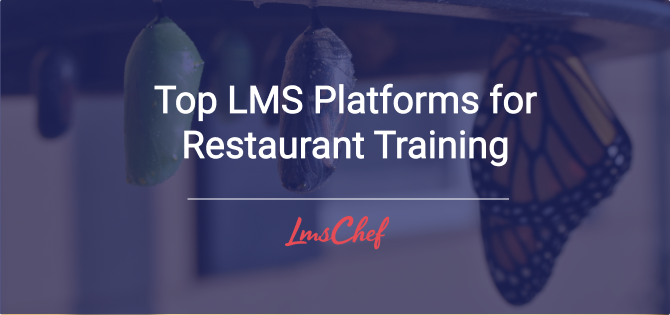In the fast-paced world of the restaurant industry, staff development and training are crucial for success. With high turnover rates and constantly evolving menus and procedures, it can be challenging to keep your staff up-to-date and engaged. That’s where a Learning Management System (LMS) comes in.
An LMS is a software platform that allows you to create, manage, and deliver online courses and training materials to your employees. It provides a centralized location for all training materials, making it easier to track progress and ensure consistency in training.
In this article, we’ll explore the top LMS platforms for restaurant training and how they can benefit your business.
Why Use an LMS for Restaurant Training?
- Streamlined Training Process
With an LMS, you can create and deliver training materials in a streamlined and efficient manner. This eliminates the need for in-person training sessions, which can be time-consuming and costly. Employees can access training materials at their convenience, allowing them to learn at their own pace.
- Consistent Training Across Locations
For restaurant chains with multiple locations, it can be challenging to ensure that all employees receive the same training. With an LMS, you can create and distribute training materials to all locations, ensuring consistency in training and procedures.
- Cost-Effective
Investing in an LMS can save your business money in the long run. With online training, you eliminate the need for printed materials, in-person trainers, and travel expenses. Additionally, with the ability to track progress and completion rates, you can identify areas where additional training may be needed, saving you money on potential mistakes or accidents.
- Engaging and Interactive Training
LMS platforms offer a variety of interactive features, such as quizzes, videos, and gamification, making training more engaging and enjoyable for employees. This can lead to better retention of information and a more motivated and knowledgeable staff.
Top LMS Platforms for Restaurant Training
1. iSpring Learn
iSpring Learn is a versatile LMS platform suitable for restaurant training. It offers a user-friendly interface and various features tailored for restaurant staff development. With iSpring Learn, you can efficiently create, manage, and deliver online courses and training materials to your employees. The platform provides a centralized location for all training resources, simplifying tracking progress and ensuring consistency in training across different restaurant locations.
iSpring Learn also supports mobile compatibility, enabling employees to access training materials conveniently on their smartphones or tablets. Moreover, it integrates seamlessly with popular restaurant management systems, such as XYZ and ABC, enhancing the overall training experience for restaurant staff.
2. Litmos
Litmos is a cloud-based LMS that offers a user-friendly interface and a variety of features specifically designed for restaurant training. It allows you to create and deliver training materials, track progress, and generate reports to assess the effectiveness of your training program.
Litmos also offers mobile compatibility, making it easy for employees to access training materials on-the-go. Additionally, it integrates with popular restaurant management systems, such as Toast and HotSchedules, for a seamless training experience.
2. Docebo
Docebo is a comprehensive LMS that offers a variety of features for restaurant training. It allows you to create and deliver training materials, track progress, and generate reports. It also offers gamification features, such as leaderboards and badges, to make training more engaging for employees.
Docebo also offers multilingual support, making it a great option for restaurants with a diverse staff. It also integrates with popular restaurant management systems, such as Square and Revel, for a more streamlined training experience.
3. TalentLMS
TalentLMS is a user-friendly LMS that offers a variety of features for restaurant training. It allows you to create and deliver training materials, track progress, and generate reports. It also offers gamification features, such as points and badges, to make training more engaging for employees.
TalentLMS also offers mobile compatibility and multilingual support, making it a great option for restaurants with a diverse staff. It also integrates with popular restaurant management systems, such as Upserve and TouchBistro, for a more seamless training experience.
4. Bridge
Bridge is an LMS specifically designed for employee development and training. It offers a variety of features, such as course creation, progress tracking, and reporting. It also offers social learning features, allowing employees to collaborate and learn from each other.
Bridge also offers mobile compatibility and integrates with popular restaurant management systems, such as Aloha and Micros, for a more efficient training experience.
5. Schoox
Schoox is an LMS that offers a variety of features for restaurant training. It allows you to create and deliver training materials, track progress, and generate reports. It also offers social learning features, such as discussion boards and peer-to-peer learning.
Schoox also offers mobile compatibility and integrates with popular restaurant management systems, such as Clover and NCR Aloha, for a more streamlined training experience.
How to Choose the Best LMS for Your Restaurant
When choosing an LMS for your restaurant, there are a few key factors to consider:
1. Ease of Use
The LMS you choose should have a user-friendly interface that is easy for both administrators and employees to navigate. This will ensure that training materials are easily accessible and that employees can complete training without any technical difficulties.
2. Mobile Compatibility
In the fast-paced restaurant industry, employees are constantly on-the-go. Choosing an LMS with mobile compatibility will allow employees to access training materials from their smartphones or tablets, making it easier for them to complete training on their own time.
3. Integration with Restaurant Management Systems
Integrating your LMS with your restaurant management system can save time and improve the training experience for employees. Look for an LMS that integrates with your current systems to ensure a seamless training process.
4. Reporting and Analytics
The LMS you choose should offer reporting and analytics features that allow you to track progress and assess the effectiveness of your training program. This will help you identify areas for improvement and make data-driven decisions for your training program.
Conclusion
Investing in an LMS for your restaurant training can save you time and money while improving the overall training experience for your employees. Consider the features and factors mentioned in this article when choosing the best LMS for your business. With the right LMS, you can ensure that your staff is well-trained and equipped to provide exceptional service to your customers.







